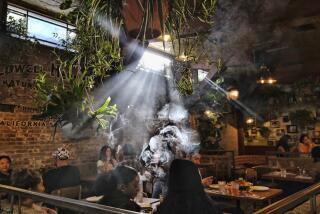The Company She Keeps : Drunk driving: Candy Lightner says she still wants reforms. But now that the MADD founder works for restaurants, some wonder whose side she’s really on.
- Share via
When Candy Lightner went to work at a consulting firm that represents restaurants that serve alcohol, she considered the job compatible with her past as the crusading founder of Mothers Against Drunk Driving.
But that hasn’t been the media perception. In a sudden wave of publicity this month, Lightner has found herself portrayed in news stories and on talk shows as having joined the enemy.
“MADD Founder Switches Sides” was a typical headline, and “lobbyist for the liquor industry” the typical job description when the media discovered Lightner’s new position.
Lightner, who founded MADD in Fair Oaks, Calif., in 1980 when her 13-year-old daughter Cari was killed by a drunk driver, says she has not changed sides.
“I am a government relations consultant on public policy issues, and it’s something I have wanted to do for a long time,” she says.
Lightner accepted the job in November with Rick Berman, whose Washington, D.C.-based Berman and Co.’s clients include the American Beverage Institute, a 4,000-member trade organization representing restaurants and other establishments that serve alcohol.
She will lobby state legislatures to reject laws that lower the legal standard for driving under the influence to .08% blood-alcohol level because she agrees with the restaurant industry’s position that these are not the dangerous drivers and it is counterproductive to waste law enforcement resources on them. Only a few states, including California, have .08% laws. Most use .10%.
“Lowering the level accomplishes nothing. I think we should target the repeat offenders--they are the real danger on our roads,” says Lightner, recalling that the man who killed her daughter had a long record of DUI arrests and had just been bailed out on a hit-and-run drunk-driving charge.
*
Berman says Lightner will lobby state legislatures for laws that distinguish among light, moderate and heavy drinkers, and adjust the penalties accordingly.
“We think that as a person’s blood-alcohol level goes up, the penalties should get stiffer,” Berman says. “The restaurant industry has never done this before.”
“This escalated penalty plan is a new approach in our country and I’m very excited about it,” Lightner says.
The American Beverage Institute maintains that the .08% standard makes criminals of social drinkers and weakens law enforcement by stretching it over a wider pool of drivers than is necessary.
With this position, Lightner breaks ranks with MADD and other organizations in the anti-drunk driving movement.
MADD’s national president, Rebecca Brown of Tampa, Fla., says she doesn’t criticize Lightner, who to the public personifies MADD’s success. The group has grown to 3 million members and is credited with toughening laws against drunk driving in every state and with reducing alcohol-related deaths on America’s highways.
“Candy made a great difference in America and we can only be grateful,” Brown says. “The issue here is not Candy Lightner. It’s .08 and we are on different sides of that issue. We have a great deal of research and evidence that even experienced drivers are impaired at that blood-alcohol level.”
California MADD worked on the campaign to lower the state’s blood alcohol level to .08%. Michelle Payne at the Sacramento office says the group has received only a few calls about Lightner and that all comments on policy come from the national office.
MADD is lobbying for .08 because its leaders think this is an achievable goal, Brown says. “However, we believe that no one should drive after drinking, period.”
*
Lightner says she is surprised at the negative reaction to her new post, since much of her progress with MADD was made in conjunction with the restaurant industry and she was praised for the results.
“We got them, in some cases, to eliminate happy hours, and two-for-one drinks, and to initiate mandatory server training for bartenders and things like designated drivers and free taxi service,” she says.
After Lightner left MADD in 1985, she wrote a book about grieving, “Giving Sorrow Words,” published in 1990. Last year, she turned her attention to Americans Against Crime, a citizens’ group aimed at stemming violent crime. “We couldn’t raise the money to keep it going,” she says. “It was partly the economy.”
Lightner, who has two grown children, lives in Alexandria, Va. She says she joined Berman’s firm because she wants to continue to make a difference.
“I’ve only been doing this for 2 1/2 months and I’m not discouraged. I believe strongly in what I’m doing and I have no problem about the world knowing.”
Of her relationship with MADD, she says, the disagreement is with the blood-alcohol level and nothing more.
“I oppose .08 and I advocate escalated penalties. I haven’t switched to the ‘other side.’ The ‘other side’ is being a defense attorney for drunk drivers.”
More to Read
Inside the business of entertainment
The Wide Shot brings you news, analysis and insights on everything from streaming wars to production — and what it all means for the future.
You may occasionally receive promotional content from the Los Angeles Times.










